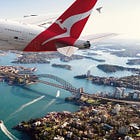2003: Mass destruction
Powell imploded. Iraq exploded. And I decided the US was home.
About fifteen years before the arrival of “cancel culture,” Colin Powell canceled himself.
Sitting before the United Nations Security Council on February 5, 2003, the decorated US military leader—a former national security advisor, chairman of the Joint Chiefs of Staff, and Secretary of State—held up a blue-capped vial and declared Iraqi leader Saddam Hussein was producing weapons of mass destruction.
“Every statement I make today is backed up by solid sources,” Powell said in his authoritative voice. “What we’re giving you are facts and conclusions. Clearly, Saddam Hussein and his regime will stop at nothing until something stops him.”
It was bullshit. All of it. Most of the world knew it was bullshit—that Hussein was big-noting himself to prevent his itchy neighbors from overthrowing him; that US President George W. Bush was looking for any excuse to invade Iraq and prove himself more than a not-too-bright feckless son who fluked the top job; and that Iraq had nothing to do with the terrorist attacks of 9/11, the predicate for the whole charade demanding the United States go after WMDs that threatened the homeland.1 Still, there Powell sat, providing false cover for a war that would begin barely a month later.
Not that there’s any comparison, but it was a year of career inflection points. While Powell spent an hour singlehandedly taking a WMD to his decades of dignified public service, I pondered the end of my tenure as New York Correspondent for the Australian Financial Review. I was going through the motions of negotiating a return to Sydney but my heart wasn’t in it, and the whole thing ended with the option of taking six months of leave without pay, just to gather my thoughts.
The smart plan would have been to spend that time relishing the American experience, then heading home sated and ready to resume my career Down Under. Of course, that’s not the option I picked. Of course. Not even a visit from my closest friends to celebrate my 30th birthday in Las Vegas and Mexico budged me—for whatever reason, I decided to stay in New York City. I had no prospects. No green card. Little money. And no real clue what I was doing. A recipe for success, obvs.
I think of 2003 as the distinct fork in my life’s road. Coming to the US for work was opportunistic—a chance to experience another country and advance my career at minimal risk. Choosing to stay was something quite different, even if the significance didn’t register at the time. I was consciously turning my back on Australia, with no return date. As I learned, spending a couple of years away means you miss a lot but can quickly catch up—I saw countless colleagues do just that. Spend two decades away? You become a foreigner everywhere.
I missed a lot that year. Unlike Powell’s dodgy vial, cricketer Shane Warne was suspended for a year for using a real substance—in true Warne fashion, it was allegedly a diuretic given to him by his mum to make him slimmer. From the instant Warne delivered his “ball of the century” in 1993—which had pretty much every cricket viewer in as much disbelief as Mike Gatting—he was utterly compelling, and being unable to see the tail end of his career will always be a sore point.2 Fun but depressing fact: 2003 marked the test debut of English fast bowler Jimmy Anderson, who now sits right behind Warne at third on cricket’s all-time list of wicket takers. I’ve literally never seen him bowl a single ball. Sigh.
Here’s what I also missed. Quentin Bryce became the Governor of Queensland (yes, states still have governors as the country clings to the ridiculousness of the British monarchy), which meant I kinda sorta knew someone important—her daughter, Chloe, had a short-lived stint doing who-knows-what at Brisbane’s Sunday Mail when I was there. Bryce (the mum) later became the first woman to be Governor-General.
Dubya went Down Under, taking a break from waging war under false pretenses to address Parliament during a whirlwind 20-hour pitstop. That wasn’t the highlight of his trip, though: he met with Steve “Crocodile Hunter” Irwin, probably to ask him if there was truth in the rumor that a top secret US satellite beacon had been swallowed by a crocodile. Get David Wenham and Magda Szubankski to the situation room!
One person who didn’t get to Australia? Me. My passport may prove me wrong, but I don’t recall going home from the moment I landed in the States in June 2001 until late 2004—more on that later. Trawling through the internet brings me up to speed to a degree, but it’s two years or so after arriving that my grip on Australia begins to slip. Stars I’ve never heard of begin their careers, and some I’ve met disappear forever.3
My priority was saving money by moving to Greenwich Village and trying to rustle up freelance work on my foreign media visa. Before all of that, though, was the pressing need to find a decent coffee shop. I spent weeks trying one after another before discovering Joe, which became a home away from home in the year ahead—and a perpetual source of what might have been, given the way New York City embraced cafe culture. Like much of life, the opportunity was staring me in the face if only I had the courage to grasp it.
About this series: Australian almanac
This is part of a series of articles examining what the heck has happened in Australia in the 23-odd years I’ve been living in the United States. The introduction to this series is here, and related posts below:
This will always be a prime example of why elections matter. I recall standing in the Fin Review newsroom in late 2000, watching CNN’s breathless coverage of the Florida recount. While no one could quite believe Americans would elect someone as obviously dimwitted as Dubya, a common sentiment was that it didn’t really matter whether he or Al Gore won—America was riding high from the Bill Clinton’s eight years in office, so who cares? After the deaths of an estimated 450,000 Iraqis and utter inaction on climate change (among many issues where Gore and Bush would have differed greatly, including economic policies favoring the wealthy), it turns out elections really do matter. Especially since Gore actually won.
When I first landed in the States, cricket simply didn’t exist on TV. Streaming services later made all the difference—first with ESPN+, then with specialist services like Willow. From 2001 to 2003, I got my cricket fix a different way. Tucked behind the Fin Review’s Soho office was a hole-in-the-wall restaurant serving the most delicious Indian food. Indian and Pakistani cab drivers flocked to it, parked illegally, ordered something pungent, and argued loudly about whatever series was under way, accompanied by the obligatory slagging of the Aussie team. Great stuff!
Country music legend Slim Dusty died in 2003. I’d interviewed him a few years earlier for the Courier-Mail on the release of album 462 or something, in a classic case of a newspaper deciding “we have to cover this but should send someone who knows absolutely nothing about it.” Maybe they thought that would have comedic value? He was a lovely man, for what it’s worth.





